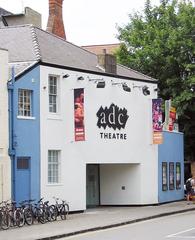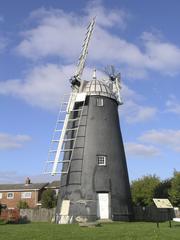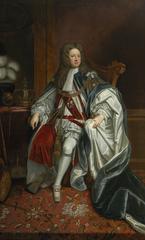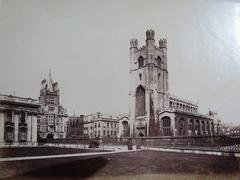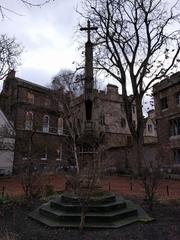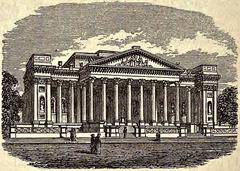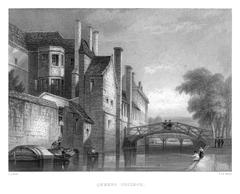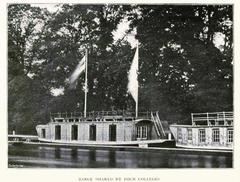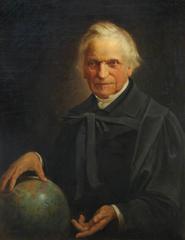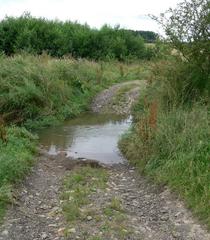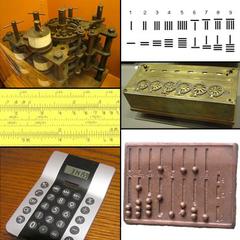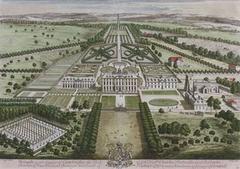Museum of Zoology Cambridge: Visiting Hours, Tickets, and Comprehensive Guide to Cambridge’s Historical Sites
Date: 14/06/2025
Introduction
Located within the world-renowned University of Cambridge, the Museum of Zoology stands as one of the United Kingdom’s leading natural history museums. With a collection exceeding two million zoological specimens—ranging from minute insects to massive marine mammals—the museum provides an exceptional window into the diversity of animal life and the story of evolution. The museum’s legacy is deeply entwined with the history of biology, featuring specimens collected by legendary figures such as Charles Darwin and Alfred Russel Wallace.
With free admission and a strong commitment to accessibility, the museum welcomes everyone: families, tourists, students, and researchers alike. Its central Downing Street location places it within walking distance of other major Cambridge attractions, making it an ideal stop for those looking to immerse themselves in the city’s rich scientific and cultural heritage. For the latest information on opening hours, special events, and travel tips, visit the museum’s official website or explore further on Visit Cambridge.
Table of Contents
- Plan Your Visit: Hours, Tickets, and Accessibility
- Museum Highlights: Collections and Key Exhibits
- Special Events, Guided Tours, and Family Activities
- Location, Getting There, and Nearby Cambridge Attractions
- Frequently Asked Questions (FAQ)
- Visual & Interactive Experiences
- Museum Shop and Whale Café
- Conclusion & Travel Tips
- References
Plan Your Visit: Hours, Tickets, and Accessibility
Opening Hours
- Tuesday to Saturday: 10:00 AM – 4:30 PM
- Sunday and Bank Holiday Mondays: 12:00 PM – 4:30 PM
- Closed: Mondays (except Bank Holidays) and major public holidays
Always check the official website before your visit for the most current hours or unexpected closures.
Admission & Tickets
- Entry: Free for all visitors; donations are appreciated to support education and conservation.
- Advance Booking: Not required for general admission. Special exhibitions or events may need advance booking—check the events calendar online.
Accessibility
- Physical Access: Step-free entrance via Whale Hall, lifts to all public galleries, and accessible toilets.
- Additional Needs: Audio guides, tactile exhibits, and support for visitors with visual or hearing impairments.
- Family Facilities: Baby-changing areas and lockers are available.
- Assistance Dogs: Welcome throughout the museum.
For further information, consult the Museum’s access guide.
Museum Highlights: Collections and Key Exhibits
The museum’s galleries are organized thematically, leading visitors from the simplest invertebrates to complex mammals. Climate-controlled storerooms preserve specimens for research and public engagement, many of which are on display.
Iconic Exhibits
- Fin Whale Skeleton: A 21-metre (almost 70-foot) skeleton suspended above the entrance hall is a must-see and a favorite photo subject (Museum of Zoology Visit Us).
- Dodo and Other Extinct Species: Original remains of the dodo, great auk, and passenger pigeon underscore themes of extinction and conservation.
- Darwin’s Beagle Specimens: Fish and other animals collected during Darwin’s voyage connect directly to the origins of evolutionary theory.
- Bird, Insect, and Mollusc Collections: Over 30,000 bird skins, 10,000+ egg clutches, and hundreds of thousands of insects, plus rare mollusc shells, illustrate the breadth of animal diversity (Museum of Zoology Collections).
- Spirit Store: View preserved soft tissue specimens in jars, vital for anatomical and genetic studies.
Interactive and Family-Friendly Features
- Hands-On Displays: Touchable specimens, digital kiosks, and specimen handling sessions during special events.
- AI Conversational Exhibit: Launched in 2025, this feature enables voice or text interaction with select specimens, offering an innovative learning experience.
- Family Trails and Games: Activities like “Animal Adventurers” engage children with museum content (Animal Adventurers).
- Workshops: “Zoology Live!” and “Nature Classroom” workshops run during school holidays (Museum Blog).
Special Events, Guided Tours, and Family Activities
- Guided Tours: Available for groups and schools; book in advance for a deeper dive into collections (Find Us – Department of Zoology).
- Temporary Exhibitions: Rotating displays focus on conservation, climate change, pollinators, and other topical themes.
- Public Lectures & Workshops: Join events during the annual Cambridge Festival or special programs highlighting current research and conservation efforts.
- Community Gallery: Features contributions from local wildlife enthusiasts and school projects.
Location, Getting There, and Nearby Cambridge Attractions
Address and Directions
- Museum of Zoology, University of Cambridge
- Downing Street, Cambridge, CB2 3EJ, United Kingdom
Getting There
- By Train: Cambridge railway station is about 1 mile (20-minute walk) away; city buses from the station stop nearby (Find Us – Department of Zoology).
- By Coach: National Express coaches arrive at Parkside (10–15 minutes’ walk).
- By Car: No on-site parking; use Grand Arcade multi-storey or Park and Ride facilities.
- By Air: Stansted Airport is the nearest, with direct rail and coach links.
Accessibility
- Step-free access, lifts, accessible toilets, and assistance for those with disabilities. See the full access guide.
Nearby Attractions
- Sedgwick Museum of Earth Sciences
- Fitzwilliam Museum
- Museum of Archaeology and Anthropology
- Cambridge University Botanic Garden
- King’s College Chapel
These sites are within walking distance, enabling a full day of cultural exploration (Best Museums in Cambridge).
Frequently Asked Questions (FAQ)
Q: What are the Museum of Zoology Cambridge visiting hours?
A: Tuesday to Saturday 10:00–16:30; Sunday and Bank Holiday Mondays 12:00–16:30; closed Mondays (except Bank Holidays) and major holidays.
Q: Is admission free?
A: Yes, entry is free; donations are welcomed.
Q: Is the museum accessible?
A: Yes, with step-free entrances, lifts, accessible toilets, and family-friendly amenities.
Q: Can I take photos?
A: Non-flash photography for personal use is permitted. No tripods, selfie sticks, or external flashes.
Q: Are guided tours available?
A: Yes, for groups and schools by prior arrangement. Contact the museum for details.
Q: Can I bring children?
A: Absolutely. The museum is family-friendly, with interactive displays and child-focused activities.
Q: Are food and drinks allowed?
A: Only in the Whale Café. Not permitted in galleries.
Visual & Interactive Experiences
- Virtual Tours: Explore the museum online via the official virtual tour.
- Interactive Map: Navigate galleries with the online map.
- High-Quality Images & Videos: Available on the museum site, featuring the fin whale skeleton, dodo remains, and other highlights.
Museum Shop and Whale Café
- Museum Shop: Located in the Whale Hall, offers books, toys, and unique zoological gifts.
- Whale Café: Open Tuesday to Saturday, 10:00–15:00, beneath the impressive fin whale skeleton—ideal for refreshments after your visit (Museum of Zoology Visit Us).
Conclusion & Travel Tips
The Museum of Zoology in Cambridge is a cornerstone of natural history, scientific research, and public engagement. Its world-class collections, iconic exhibits, and commitment to accessibility make it a must-visit for anyone interested in the wonders of the animal kingdom. With free entry and a welcoming environment for all ages, it is perfectly suited for individual visitors, families, or groups exploring Cambridge’s broader historical and cultural landscape.
Travel Tips:
- Best times to visit: Weekday mornings are typically quieter.
- Combine your visit: Take advantage of the museum’s central location by visiting nearby Cambridge attractions.
- Stay informed: Download the Audiala app for audio guides and up-to-date visitor information. Follow the museum’s social media channels for news and events.
References
- Discover the Museum of Zoology Cambridge: Visitor Guide, History & Tips, 2025, Museum of Zoology Cambridge (https://www.museum.zoo.cam.ac.uk/)
- Museum of Zoology Cambridge: Visiting Hours, Tickets, and Exploring Cambridge’s Premier Historical Site, 2025, Museum of Zoology Cambridge Official Site (https://www.zoo.cam.ac.uk/)
- University Museum of Zoology Cambridge Visiting Hours, Tickets, and Highlights: Your Guide to Cambridge’s Premier Historical Site, 2025, Visit Cambridge (https://www.visitcambridge.org/place/museum-of-zoology/)
- Discover the Museum of Zoology in Cambridge: Visiting Hours, Tickets, and Essential Visitor Information, 2025, Britain Express & Museum of Zoology Blog (https://www.britainexpress.com/counties/cambridgeshire/az/cambridge/museum-zoology.htm)
- Museum of Zoology Collections (https://www.museum.zoo.cam.ac.uk/collections-research)
- Animal Adventurers (https://museumofzoologyblog.com/)
- Find Us – Department of Zoology (https://www.zoo.cam.ac.uk/about-us/find-us)
- Best Museums in Cambridge (https://whichmuseum.co.uk/place/cambridge-2029/best-museums)
